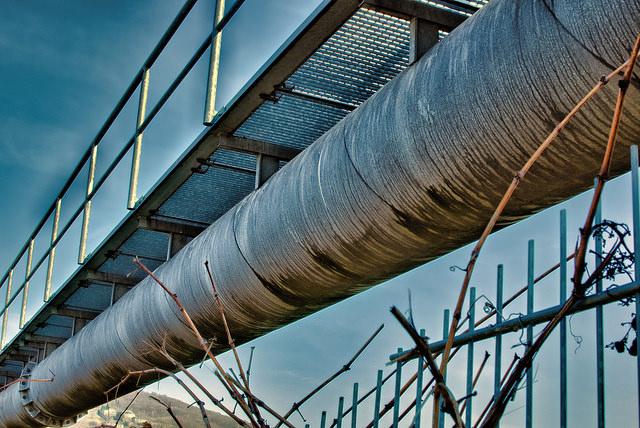Europe’s pipeline politics
Posted By Jacqueline Westermann on April 30, 2018 @ 12:30

Angela Merkel’s statement after her meeting with Ukrainian President Petro Poroshenko in Berlin on 10 April came as a surprise to many. The German chancellor said that the highly controversial pipeline project Nord Stream 2 would have a future only if the project included a transit role for Ukraine.
The German maritime authority had approved [1] the project in late March. Nord Stream 2 aims to transport Russian natural gas from Siberia to Germany through a 1,200‑kilometre pipeline under the Baltic Sea. Nord Stream 2’s capacity would be 55 billion cubic metres per year [2]. The €9.5 billion project is intended to be online by the end of 2019. It’s being financed mainly by Russian state-run Gazprom, with support from British firm Royal Dutch Shell, German companies Uniper and Wintershall, French firm Engie and Austria’s OMV.
Because the pipeline would run through the Baltic Sea, it would circumvent countries such as Poland, Ukraine and the Baltic states. Europe has been arguing about the project for years, and the German government had supported the original plan to run it through the ocean. Merkel’s change of mind could rattle Germany’s young coalition government. In the past, the German government had argued that because Nord Stream 2 would be a private industry project, politicians shouldn’t dictate the route. This argument was also used to deflect the European Union’s stark criticism of the project.
Proponents of the project argue [3] that it would diversify Europe’s range of energy providers, secure its gas supply and drive competition in its energy industry. It seems the political character of the project has finally been recognised. Aside from avoiding transit through central-eastern and eastern European countries, a major point of criticism is the heightened dependence on Russian energy that Nord Stream 2 would bring to Europe.
Europe’s dependence on Russian gas is at an all-time high: 30% of EU gas deliveries come from Russia [4], and 40% of the continent’s gas is supplied by Gazprom [5]. And the volume is growing from year to year. The dependence differs from country to country. Central-eastern and eastern European nations often buy only Russian gas, though some are trying to change that. Poland and the Baltic states are trying to minimise their dependence on Russian gas by increasing their imports of liquefied natural gas (LNG) from the US or Arabian peninsula states such as Qatar. Around Europe’s coast, dozens of LNG terminals have been installed and are ready to use. That also explains the strong aversion of the US towards Nord Stream 2: if the project fails, it creates the opportunity for greater US exports of LNG to the continent.
Another criticism is the intended one-pipe construction. Nord Stream 2 would carry almost all of Russia’s gas exports to Europe through one pipe, at very low cost to Russia because it would circumvent transit countries. But it also gives the Russian government the power to regulate the flow of gas.
Ukraine has had very bad experiences because of its high dependence on Russian energy. Several times Moscow has turned off the flow to put political pressure on Ukraine’s government. Ukrainians froze as a result. Between 1991 and 2004 central-eastern and eastern European countries ‘suffered over 40 politically motivated cutoffs’ [6] of gas supplies.
Ukraine’s role as a transit country would become irrelevant with the implementation of Nord Stream 2 (and its sister project, Nord Stream 1). Furthermore, Russia intends to build another pipeline through Turkey to avoid supplying gas via Ukraine, as this infographic [7] highlights. War-torn Ukraine relies heavily on this income, and could lose up to $3 billion per year [8] if it ceases to be a gas transit country.
According to Dr Elizabeth Buchanan from the Australian National University, there’s another strategic issue presenting itself: ‘If Ukraine lost all its transit-ability for European gas deliveries, there is no longer the incentive for Russia to avoid all-out armed conflict as the region is not required to be relatively peaceful for those pipelines anymore.’
Many might wonder what triggered Merkel’s change of heart. European states have been authorising the disputed Nord Stream 2 pipeline, with Finland [9] the latest to give the green light. Merkel’s message was crucial: it would send the wrong message to the Kremlin to expel Russian diplomats after the Salisbury attack, and to impose sanctions following the annexation of Crimea in 2014, while at the same time facilitating business with Russian state-owned energy company Gazprom and ignoring Moscow’s strategic exclusion of embattled Ukraine.
Russia will need to listen to the chancellor. Alternatively, its struggling economy will suffer a significant blow if gas exports to Europe are reduced. Russia relies on them. While the continent has an interest in keeping Russia dependent on Europe as a customer for its gas, the continent also clearly needs to ensure that gas flows along a range of pipeline routes.
Article printed from The Strategist: https://aspistrategist.ru
URL to article: /europes-pipeline-politics/
URLs in this post:
[1] approved: https://www.reuters.com/article/us-russia-germany-nordstream/germany-fully-approves-russia-built-nord-stream-2-gas-pipeline-idUSKBN1H31IF
[2] 55 billion cubic metres per year: http://www.europarl.europa.eu/RegData/etudes/ATAG/2016/580875/EPRS_ATA(2016)580875_EN.pdf
[3] Proponents of the project argue: http://www.handelsblatt.com/my/politik/international/erdgas-pipeline-merkels-haltung-zu-nord-stream-2-stellt-koalitionskompromiss-infrage/21163080.html?ticket=ST-989488-kASr6x7mUsLXOWBVDzFQ-ap3
[4] 30% of EU gas deliveries come from Russia: http://www.deutschlandfunk.de/nord-stream-2-vor-baubeginn-gaspipeline-durch-die-ostsee.724.de.html?dram:article_id=415442
[5] supplied by Gazprom: https://www.ft.com/content/7b86f4be-f08e-11e7-b220-857e26d1aca4
[6] ‘suffered over 40 politically motivated cutoffs’: http://carnegieeurope.eu/strategiceurope/71507
[7] infographic: http://tass.com/infographics/7275
[8] $3 billion per year: https://euobserver.com/energy/141570
[9] Finland: https://www.reuters.com/article/us-gazprom-nordstream/gazprom-gets-finnish-approval-to-build-nord-stream-2-gas-pipeline-idUSKCN1HC1KB
Click here to print.